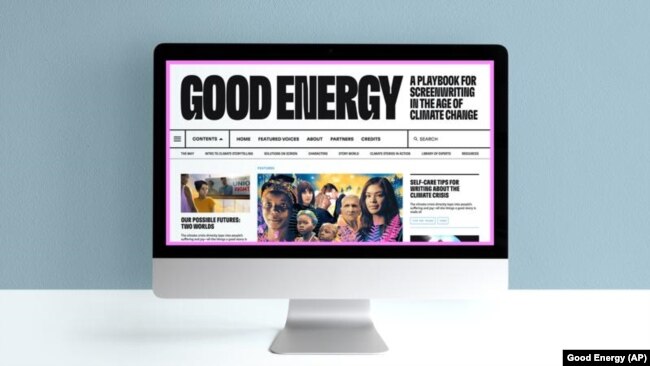私のイメージでは、アメリカ映画は異常気象がもたらす題材を結構扱っているという認識でした。しかし、この記事にあるように最近は少ないようです。
意識しなければ、何も変わらない!!
映画も一役買う必要がありますそうですね、大衆文化ですから!!
今日もVOAで英語を学びましょう!!
研究結果 :ハリウッドは気候変動に関する映画の場面を見逃している(和訳)
Study: Hollywood Missing Film Moments about Climate Change
April 22, 2022
ある非営利団体が最近、映画やテレビの脚本家に、ストーリーや作品の中で気候変動をもっと頻繁に使ってもらうための取り組みを発表しました。
この団体、グッド・エナジーは非営利の助言団体です。この団体は最近、”グッド・エナジー:気候変動時代における脚本家のための”プレイブック "を発表しました。
グッドエナジーは、多くのハリウッドスターがこの問題について話しているにもかかわらず、映画では気候変動に関連する言葉があまり使われていないことを発見しました。同団体は、アメリカの映画やテレビ番組で使われている言葉の調査を資金面で支援しました。
研究者たちは、2016年から2020年までの37,453本の映画とテレビ番組で使われた言葉、つまりトランスクリプトを調べました。その結果、フィクション映画の2.8%に気候変動に関連する言葉が使われていることがわかりました。
トランスクリプトの調査は、ロサンゼルスの南カリフォルニア大学にあるNorman Lear Center's Media Impact Projectによって行われました。
研究の一部は公表されていません。研究者たちは、米国で公開されたテレビ番組や映画の中で、”気候変動”のような36の単語やフレーズとの関連性を探りました。
アンナ・ ジェーン・ ジョイナー氏は、"Playbook "の代表執筆者であり、Good Energyの創設者でもあります。彼女によると、”プレイブック”は100人以上の映画やテレビの脚本家のアドバイスを受けて作成されたそうです。
脚本家が気候の話を災害と結びつけてしまうことが問題であったと彼女は言います。”プレイブック”の主な目的は、作家が気候変動を実生活にどう反映させるか、その可能性を広げることにあると彼女は話します。
ジョイナー氏のグループは、作家や業界のリーダーたちに、より災害に関連しないストーリーを検討するよう求めていると彼女は話しています。また、例や資料も含めるべきだと。
ジョイナー氏によると、同グループのウェブサイトには”範囲”があり、気候変動の影響から考えられる答えまで、あらゆるものが掲載されていると言います。例えば、ビルの外壁に設置されたソーラーパネルが映し出されるような映画が考えられると彼女は言います。また、気候変動についてさりげなく話すことも効果的だとも。
このプロジェクトには、Bloomberg Philanthropies、Sierra Club、Walton Family Foundationなどが資金援助をしています。
ドロシー・フォーテンベリー氏はテレビ作家で、“The Handmaid’s Tale” の脚本家です。この業界は、さまざまなテーマについて書くだけでなく、さまざまな人々について書く必要がある、と彼女は言います。
「気候変動は、必ずしもハリウッドがストーリーを書きがちな人たちではない人たちに影響を与えています。バングラデシュの農民、ペルーの農民、ケンタッキーの農民が影響を受けているのです。」とフォーテンベリー氏は言います。
もし作家がさまざまな人々についての物語を書けば、気候変動を簡単に取り入れることができるはずだとフォーテンベリー氏は付け加えています。
ジョイナー氏は、15年間さまざまな業界で気候変動に関するコミュニケーションに携わってきたと言います。
最初の10年間は、誰も答えてくれないので、”虚空に向かって叫ぶ”ような気分だったと言います。しかし、アメリカ人の間で気候変動に対する関心が高まっている証拠があると、彼女は言います。その中には、ハリウッドの人々も含まれています。
「私たちは皆、ある種の目覚めを経験したのです。」と、彼女は言いす。気候変動に関するドキュメンタリー、実話に基づく映画、ニュース番組がたくさんあると、彼女は語ります。
フィクションクリエーターが進歩することに期待したいと彼女は表明しています。
Study: Hollywood Missing Film Moments about Climate Change
A non-profit group recently announced an effort to get movie and television writers to use climate change more often in their stories and productions.
The group, Good Energy, is a not-for-profit advising organization. It recently announced the release of “Good Energy: A Playbook for Screenwriting in the Age of Climate Change.”
Good Energy found although many Hollywood stars talk about the issue, climate change-related words are not used a lot in movies. The group helped financially support research of words used in American films and television shows.
Researchers looked at the words, or transcripts, used in 37,453 films and TV shows from 2016 to 2020. They found that 2.8 percent of fiction films used words related to climate change.
The transcript research was carried out by the Norman Lear Center’s Media Impact Project at the University of Southern California in Los Angeles.
Part of the study has not been released. Researchers looked for links to 36 words and phrases like “climate change” in TV shows and films released in the United States.
Anna Jane Joyner is the head writer of the “Playbook” and founder of Good Energy. She said the “Playbook” was created with advice from more than 100 film and television writers.
She said it was a problem that writers were linking climate stories with disaster. She said the main purpose of the “Playbook” is to expand the possibilities for writers to show how climate change would show up in real life.
Joyner said her group is asking writers and industry leaders to consider stories that are less disaster-related. She said they also should include examples and resources.
Joyner said the group’s website has a “spectrum,” with everything from the effects of climate change to possible answers. As an example, she said movies could include shots showing solar panels on the outside of a building. Casually talking about climate change can also be effective, she said.
Bloomberg Philanthropies, the Sierra Club and the Walton Family Foundation are among those providing financial support for the project.
Dorothy Fortenberry is a TV writer. She wrote “The Handmaid’s Tale.” She said the industry needs to write about different kinds of people not just different subjects.
“Climate change is something that right now is affecting people who aren’t necessarily the people that Hollywood tends to write stories about. It’s affecting farmers in Bangladesh, farmers in Peru, farmers in Kentucky,” Fortenberry said.
She added that if writers told stories about different kinds of people, there would be chances to easily include climate change.
Joyner says she has worked on communications related to climate change in different industries for 15 years.
She said for the first 10 years, it felt like “screaming into the void” because nobody answered. But there is evidence of increasing concern among Americans about climate change, she said. That includes those in Hollywood.
“We’ve all gone through a kind of awakening,” she said. There are a number of documentaries, films based on true events, and news programs about climate change she said.
She expressed hope that fiction creators will make progress.
Words in This Story
fiction – n. written stories about people and events that are not real; literature that tells stories which are imagined by the writer
spectrum – n. a large group of possibilities; a wide range
solar panel – n. a large, flat piece of equipment that uses the sun's light or heat to create electricity
casual – adj. happening by chance: not planned or expected
tend – v. used to describe what often happens or what someone often does or is likely to do
scream – v. to say (something) in a loud and high voice because you are angry or afraid
void – n. a large empty space
